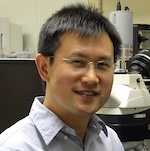Breadcrumb
NextGen Precision Health Neuroscience Seminar – Feb. 12, 2024
The goal of the NextGen Precision Health Neuroscience Science Seminar is to highlight transdisciplinary precision research taking place in the field, provide opportunities for collaboration among researchers to build their own research efforts and promote clinical/researcher activity across the University of Missouri System and our partners.
For questions about this event, please reach out to Veronica Lemme at lemmev@health.missouri.edu.
“Intraspinal Dopamine Regulating Micturition Reflexes After Spinal Cord Injury”
Presented by: Shaoping Hou, Ph.D., Associate Professor, Dalton Cardiovascular Research Center, Department of Pathology and Anatomical Sciences, and Physical Medicine and Rehabilitation, University of Missouri
Date: Feb. 12, 2024, 4-5 p.m.
Location: Roy Blunt NextGen Precision Health Building/Atkins Family Seminar Room
*Zoom option available
Register Here
Description
Dopamine (DA) neurons in the mammalian central nervous system are thought to be restricted to the brain. DA-mediated regulation of urinary activity is considered to occur through an interaction between midbrain DA neurons and the pontine micturition center. In the present study, we demonstrated that DA neurons reside in the rat lumbosacral spinal cord, and their plasticity after spinal cord injury contributes to a low level of sustained, local spinal DA expression. Furthermore, spinal DA receptors regulating bladder reflex are active, indicating that this spinally derived DA modulates the recovered micturition function.
Speaker Bio
Dr. Shaoping Hou is an associate professor in the Dalton Cardiovascular Research Center, Department of  Pathology and Anatomical Sciences, and Physical Medicine and Rehabilitation at the University of Missouri School of Medicine. He earned his Ph.D. in neuroscience from China. During his postdoctoral work, Dr. Hou specialized in autonomic cardiovascular dysfunction after spinal cord injury (SCI) at the University of Kentucky and in axon regeneration and cell transplantation at the University of California, San Diego. In addition, he has studied micturition function and pharmacological techniques in animal experiments under the guidance of Dr. William C. de Groat at the University of Pittsburgh. In 2016, Dr. Hou was appointed as a tenure-track assistant professor at Drexel University College of Medicine. His laboratory is focused on autonomic dysfunction after SCI, with an emphasis on micturition and cardiovascular disorders. Using multiple approaches and rodent models, his team aims to determine neuronal underpinnings underlying autonomic dysfunction while exploring novel therapeutic strategies for functional recovery. Dr. Hou’s major contributions to science include the discovery of intraspinal dopaminergic mechanisms regulating pelvic organ activity and investigating the role of neural progenitor cell transplants to restore cardiovascular function following SCI. He believes that both revealing scientific unknowns and fostering the minds of young scientists are his greatest responsibilities.
Pathology and Anatomical Sciences, and Physical Medicine and Rehabilitation at the University of Missouri School of Medicine. He earned his Ph.D. in neuroscience from China. During his postdoctoral work, Dr. Hou specialized in autonomic cardiovascular dysfunction after spinal cord injury (SCI) at the University of Kentucky and in axon regeneration and cell transplantation at the University of California, San Diego. In addition, he has studied micturition function and pharmacological techniques in animal experiments under the guidance of Dr. William C. de Groat at the University of Pittsburgh. In 2016, Dr. Hou was appointed as a tenure-track assistant professor at Drexel University College of Medicine. His laboratory is focused on autonomic dysfunction after SCI, with an emphasis on micturition and cardiovascular disorders. Using multiple approaches and rodent models, his team aims to determine neuronal underpinnings underlying autonomic dysfunction while exploring novel therapeutic strategies for functional recovery. Dr. Hou’s major contributions to science include the discovery of intraspinal dopaminergic mechanisms regulating pelvic organ activity and investigating the role of neural progenitor cell transplants to restore cardiovascular function following SCI. He believes that both revealing scientific unknowns and fostering the minds of young scientists are his greatest responsibilities.